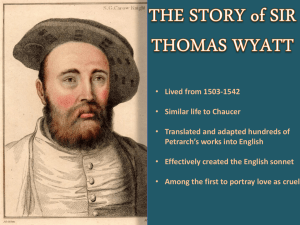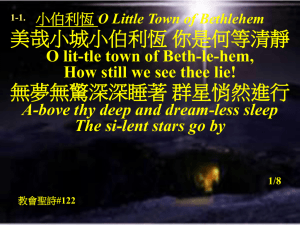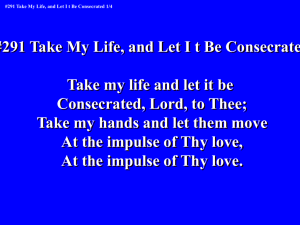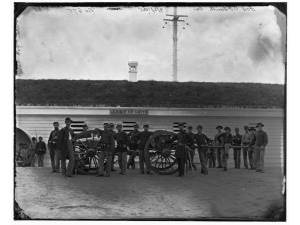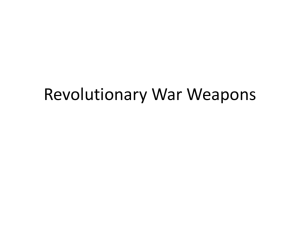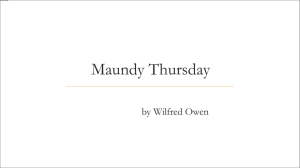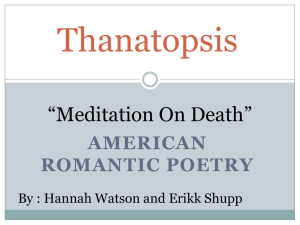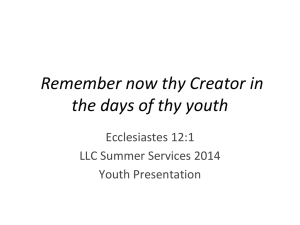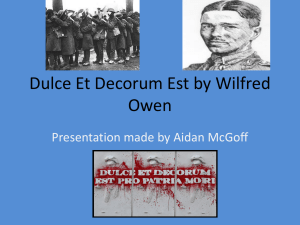Sonnet
advertisement
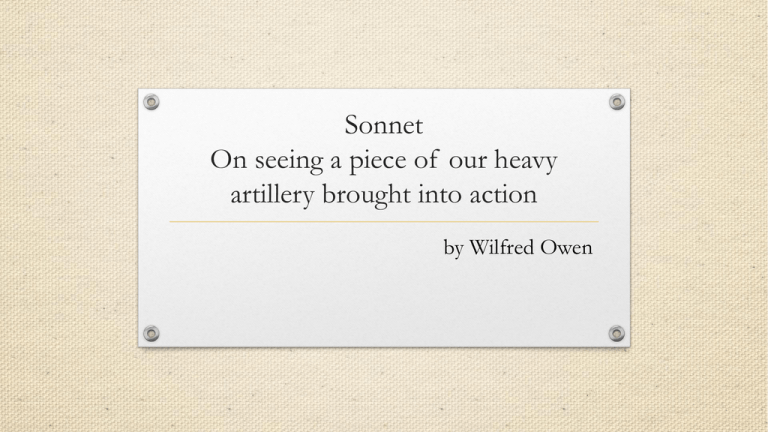
Sonnet On seeing a piece of our heavy artillery brought into action by Wilfred Owen Be slowly lifted up, thou long black arm, Great gun towering toward Heaven, about to curse; Spoken Sway steep against them, and for years rehearse Huge imprecations like a blasting charm! curses Reach at that arrogance which needs thy harm, And beat it down before its sins grow worse; Pay out Spend our resentment, cannon, yea, disburse Our gold in shapes of flame, our breaths in storm. Curse Yet, for men’s sakes whom thy vast malison Must wither innocent of enmity, Be not withdrawn, dark arm, thy spoilure done, Safe to the bosom of our prosperity. But when thy spell be cast complete and whole, May God curse thee, and cut thee from our soul! Explanation? Octet Sestet Owen expresses a typical pro-war view - war against Germany is just and necessary and that God is on the side of the allies. In contrast to the octet, Owen expresses the horror of war and that God will judge those responsible for the war. Context? - Written in July 1917 Significance? Written at Craiglockhart (June – November 1917) after Wilfred Owen came under the influence of Sigfried Sassoon Themes? • Aggression of war • Pity of war seen by the vulnerability of men in the face of weapons of destruction • Nationalism + the monetary cost of war • God will judge those responsible for the war Significance of the title? Owen was greatly influenced by the poetry of John Keats. One of Keats’ sonnets was entitled: On Seeing the Elgin Marbles, which Owen may have used ironically as the pattern for On Seeing a Piece of Our Heavy Artillery. Keats’ sonnet celebrates the Greek sculptures, a creative and cultural depiction of an ancient conflict. Owen’s sonnet exposes the destructive nature of war. Personification of ‘great gun’? • • • • - Referred to as ‘thou’, ‘thy’, ‘thee’ Why? Human voice 1. Draws attention to the symbolism of the ‘great gun’ by giving it human properties. ‘Curse’, ‘Imprecations’ Human actions ‘Rehearse’, ‘Spend’ Human will ‘Reach’, ‘Beat’ Symbolism of ‘great gun’: - War - Militaristic, aggressive spirit that fuelled the war 2. The First World War is the first example of mechanisation of war, to expose the fact that machines are quite inhuman. Form? Sonnet Petrarchan - A way of romanticising the war - Personification of the ‘great gun’ - After the octet containing a strong supports this idea pro-war argument, ‘Yet’ marks and emphasizes a clear volta - Sestet responds to the octet with an opposite anti-war view, made clear in the rhyming couplet Structure? • Rhyme scheme - abbaabba cded ff - Regular rhyming pattern in the octet unsettled by the final pararhyme of ‘harm’ and ‘storm’ - Change in rhyming pattern after the volta emphasizes the change of message - Rhyming couplet introduces final idea Structure? • • - Rhythm Pentameter Disrupted in line 2 of the octet to emphasize ‘curse’ Meter Mixture of starting off iambs and trochees Trochees give emphasis to the imperatives Alliteration? • ‘Great gun’ - Repeated ‘g’ sounds give weight to • Sibilance - ‘sins’, ‘worse’, ‘spend’, ‘resentment’, • ‘Sway sweep’ - Repeated ‘s’ sounds emphasize the • - the weapon swinging out motion of the cannon when about to attack ‘disburse’, ‘breaths’, ‘storms’ Angry hissing sound Plosive ‘cast complete’, ‘curse’, ‘cut’ Adds to the finality of God’s action Language? • Spiritual/ Biblical - ‘Heaven’, ‘curse’, ‘sins’, ‘God’, ‘soul’ - ‘Thou’, ‘thy’, ‘thee’ Why? Lends authority - Octet: Supports the idea that God is on the side of the allies - Sestet: Supports the ultimate idea that God will judge those responsible for the war Language? • - Archaic language Why? ‘Malison’, ‘spoilure’ Gives the ‘great gun’ an air of ‘Thou’, ‘thy’, ‘thee’, ‘yea’ ‘Be not withdrawn’ dignity and importance Metaphors? • • • - ‘towering towards Heaven’ The gun strives to reach heaven, to become God-like ‘rehearse’ Artillery fire sounds out year after year as if practicing to become perfect ‘imprecations [like a blasting charm]’ simile Artillery creates noises of war but war itself blasts at life, causing death and destruction • • • - ‘spend’ Pun on ‘spent’ (ammunition) In the sense of spending money • ‘our breath in storms’ - The gun also ‘spends’ the life of men in war ‘gold in shapes of flame’ • ‘thy vast malison’ • ‘when thy spell be cast’ - The death and destruction caused Britain’s gold reserves spent on buying armaments which would go up in flame • ‘cut thee from our soul’ - Humankind to be free of such ‘disburse’ Also spending money by the gun weapons of war Military tone? • • - Aggressive use of the ‘great gun’ Imperative language Use of imperative verbs in alternate odd lines of the octet Giving of orders to the ‘great gun’ ‘Be … lifted up’, ‘Sway’, ‘Reach’, ‘Spend’ Irony? - The octet supports a pro-war view yet it is clear from the sestet that Owen’s view is the opposite - In the octet, Owen orders the ‘great gun’ to strike out at the enemy yet in the sestet, it is clear that Owen does not agree with the morality of those orders References? • • • • http://www.wilfredowen.org.uk/poetry/sonnet http://crossref-it.info/textguide/wilfred-owen-selected-poems/36/2636 http://crossref-it.info/textguide/wilfred-owen-selected-poems/36/2637 http://crossref-it.info/textguide/wilfred-owen-selected-poems/36/2638 THE END
